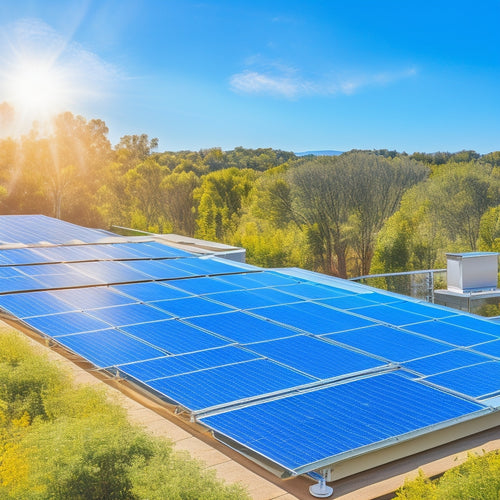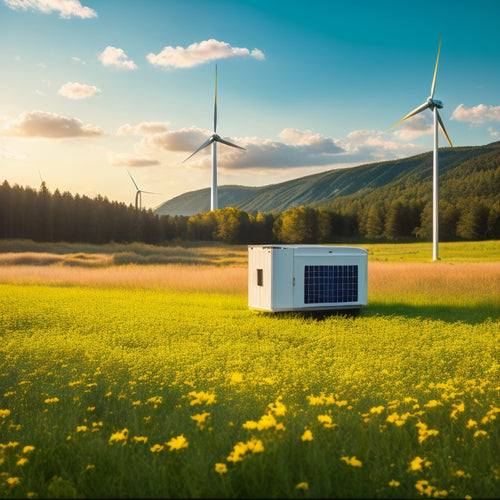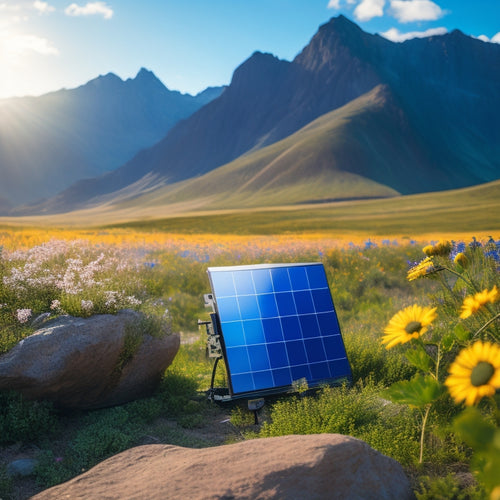
Solar Panels and Battery Prices
Share
As you investigate the possibility of utilizing solar power and energy storage, you'll find that the combined cost of solar panels and battery prices is decreasing, making it more affordable to achieve energy independence and markedly reduce your reliance on the grid. By combining solar panels and battery storage, you can create "Energy Independence Days" where you fully meet your energy needs, reducing or even eliminating your utility bills. With proper system design and sizing, you'll be on your way to a sustainable future, and there's more to uncover about how these systems can benefit your wallet and the environment.
The Essentials
- Solar panels and batteries can eliminate energy bills permanently, leading to significant long-term savings on energy costs.
- A combination of solar panels and battery storage enables energy independence, reducing reliance on the grid and providing free power.
- The cost of solar panels and batteries varies depending on the quality, brand, and capacity, with high-efficiency systems typically being more expensive.
- Installing solar panels and batteries can increase home equity and resale value, with energy upgrades potentially recouping up to 100% of their cost.
- Properly sizing a solar panel system and selecting high-efficiency inverters are crucial for maximizing energy production and optimizing system performance.
Zero Energy Bills
When you combine solar panels with a battery storage system, you can experience Energy Independence Days, where your energy needs are fully met by your solar power system.
By integrating a battery storage system into your solar setup, you'll access the full potential of renewable energy and create a more sustainable, dependable, and cost-effective power solution Renewable Energy Storage.
With a fully charged battery, you'll enjoy Free Power Forever, reducing your reliance on the grid and saving you money on your utility bills.
Energy Independence Days
Utilizing solar energy enables you to break free from the grid, and energy independence days become a reality when your solar panel system produces more electricity than you consume. On these days, you're not reliant on the grid, and your energy bills dwindle to zero.
This is made possible by your solar panel system's ability to generate excess energy, which is then stored in your battery storage system for later use. With a reliable off-grid solar power system renewable energy solutions, you can guarantee a seamless shift to energy independence. As a result, you enjoy solar independence, reducing your reliance on the grid and your energy bills.
With a properly sized solar panel system and sufficient battery storage, you can maximize your energy independence days. This means you'll have a steady supply of clean energy, even during periods of low sunlight.
Free Power Forever
Achieving energy independence days is just the beginning. Now, you're ready to take it to the next level: free power forever.
With solar panels and a battery storage system, you can say goodbye to energy bills for good. A high-performance battery for off-grid solar systems can alleviate concerns about inconsistent power supply and premature battery degradation, providing a seamless and reliable power supply that maximizes energy storage and minimizes maintenance Renewable Energy Storage.
You'll be utilizing the power of renewable resources, generating clean energy, and storing excess for later use. This means you'll have a steady supply of electricity, even on cloudy days or during power outages.
Your solar savings will add up quickly, and you'll be amazed at how much you can save on your energy costs. Imagine having zero energy bills, no more worrying about rate hikes, and no more dependence on the grid.
You'll have the freedom to power your home, your way. With free power forever, you'll be living off the grid, but still enjoying all the comforts of modern life.
You'll be part of a sustainable future, and you'll be saving money while doing it. The possibilities are endless, and the benefits are undeniable.
Boosts Property Value Fast
By installing solar panels and batteries, you'll increase your home's equity and potentially enhance its selling price.
With the average cost of single solar panels for homes being more affordable than ever residential solar panel prices, it's no wonder that solar-powered homes are highly sought after, and buyers are willing to pay a premium for them.
As a result, you can expect a significant return on investment, making your property more attractive to potential buyers.
Increased Home Equity
As a homeowner, you're likely no stranger to the concept of sweat equity - the value that comes from investing time and effort into your property. However, you mightn't be aware of the significant impact that solar panels and energy storage systems can have on your home's equity.
By investing in these sustainable upgrades, you're not only reducing your carbon footprint but also increasing your property's value. This is especially true in today's market, where eco-conscious buyers are willing to pay a premium for homes with energy-efficient features.
In fact, studies have shown that energy upgrades can recoup up to 100% of their cost at resale, making them a sound financial investment. Additionally, solar panels and battery systems can also increase your home's resale value by up to 17%.
As you consider your next home renovation project, it's crucial to prioritize energy upgrades, which can provide significant financial benefits and enhance your property's appeal to potential buyers.
Higher Selling Price
Your decision to install solar panels and energy storage systems can greatly enhance your property's value, leading to a higher selling price when you decide to put it on the market.
This is because these eco-friendly features are highly sought after by environmentally conscious homebuyers who are willing to pay a premium for them.
In fact, studies have shown that homes with solar panels can sell for up to 15% more than similar homes without them.
Inverter Efficiency Matters Most
You're likely aware that inverters play an essential role in converting DC power from your solar panels into usable AC power for your home.
When it comes to maximizing your solar power, pairing your system with a reliable solar home energy storage solution can help you store excess energy for later use.
However, you may not know that inverter efficiency has a significant impact on your system's overall performance.
When selecting an inverter, you'll want to prioritize high-efficiency options and optimize power conversion to maximize your energy harvest.
High-Efficiency Inverter Options
By the time you've selected your solar panels and battery, it's essential to evaluate the inverter that will tie everything together. Inverter technology advancements have led to the development of high-efficiency inverter options that can greatly impact your solar energy system's overall performance.
When choosing an inverter, you'll want to reflect on smart inverter features that enable real-time monitoring, remote troubleshooting, and automatic software updates. These features allow you to stay on top of your energy production and respond quickly to any issues that may arise.
High-efficiency inverters can also provide advanced grid support functions, such as reactive power compensation and voltage support, which enable a more stable and resilient grid.
Look for inverters with high efficiency ratings, typically above 98%, to minimize energy losses and maximize your energy harvest. Additionally, evaluate inverters with a wide input voltage range to accommodate varying solar panel outputs.
Optimizing Power Conversion
High-efficiency inverters play a vital role in releasing the full potential of your solar energy system, and optimizing power conversion is where their capabilities truly shine. When it comes to maximizing your energy harvest, every percentage point counts. That's why you should focus on optimizing power conversion to guarantee you're getting the most out of your solar panels.
| Inverter Efficiency | Annual Energy Yield |
|---|---|
| 95% | 4,750 kWh |
| 97% | 5,100 kWh |
| 99% | 5,450 kWh |
| 99.5% | 5,650 kWh |
Wattage Matches Your Load
You need to guarantee your solar panel system's wattage matches your load to optimize energy production and reduce waste.
By adopting renewable energy solutions and energy storage systems, you can reduce your reliance on the grid and stay powered during outages renewable energy solutions.
To do this, you'll need to calculate your load requirements accurately, considering factors like appliance wattage and usage patterns.
Load Calculation Essentials
Accurate load calculation is essential to ensuring your solar panel system and battery can handle the power requirements of your home or business. You need to determine the total energy demand of your appliances, lights, and other devices to size your system correctly.
Load estimation involves identifying the maximum power you'll need at any given time, known as the peak load. This calculation takes into account the type and number of devices, their wattage, and the hours of operation.
To perform an accurate load calculation, you'll need to gather data on your energy usage patterns. Start by making a list of all the devices you want to power with your solar panel system. Note their wattage and the number of hours you use them daily.
You can find this information on the device's nameplate or manufacturer's website. Add up the total wattage and calculate the total daily energy consumption in watt-hours (Wh). This information will help you determine the required capacity of your solar panel system and battery.
System Sizing Strategies
With your total daily energy consumption in watt-hours (Wh) calculated, it's now time to determine the required capacity of your solar panel system. This is where system sizing strategies come into play. You'll need to take into account your energy usage patterns, energy forecasting, and system optimization to guarantee your solar panel system meets your energy needs.
To achieve this, you'll need to calculate the required wattage of your solar panel system. A general rule of thumb is to oversize your system by 10-20% to account for energy losses and variability in sunlight.
Here's an example of how to calculate the required wattage based on your energy consumption:
| Energy Consumption (Wh) | Required Wattage (W) | System Size (kW) |
|---|---|---|
| 2000 Wh | 200 W | 2 kW |
| 4000 Wh | 400 W | 4 kW |
| 6000 Wh | 600 W | 6 kW |
| 8000 Wh | 800 W | 8 kW |
Lower Carbon Footprint Guaranteed
You're switching to a cleaner energy source by investing in solar panels and battery storage, which means you'll greatly reduce your reliance on fossil fuels.
As a result, you'll produce fewer greenhouse gas emissions, contributing less to climate change and air pollution.
Eco-Friendly Energy Source
Your shift to renewable energy begins with utilizing the power of solar panels, a dependable eco-friendly energy source that guarantees a lower carbon footprint. By utilizing solar energy, you're contributing to a sustainable living environment, reducing your reliance on non-renewable resources and mitigating the environmental impact of energy consumption.
As you integrate solar panels into your energy system, you'll experience long-term savings through energy conservation and reduced grid reliance. Additionally, policy incentives and technological advancements have made solar energy more accessible and affordable, allowing you to join the growing community of individuals committed to a cleaner, healthier environment.
As you evolve to renewable resources, you'll benefit from the advantages of grid integration, which enables you to store excess energy for later use or feed it back into the grid. This not only reduces your energy costs but also provides a sense of freedom and independence from traditional energy sources.
Frequently Asked Questions
Can I Install Solar Panels on a Rented Property?
You'll need to obtain your landlord's permissions before installing solar panels on a rented property, but you may have tenant rights that protect your ability to make energy-efficient improvements, so it's crucial to review your lease agreement and local laws.
How Long Does It Take to Install a Solar Panel System?
You're wondering how long it takes to install a solar panel system; typically, it takes 1-3 days for a standard residential installation, depending on the complexity of the system components and your roof's condition.
Are Solar Panels Damaged by Hail or Heavy Rain?
You'll be relieved to know that solar panels are designed to withstand harsh weather conditions, boasting impressive hail resistance and weather durability, ensuring your investment remains intact even during intense storms and heavy rainfall.
Do Solar Panels Work During a Power Outage?
Back in the Wild West, you'd be asking the right question! During a power outage, you won't get juice from the grid, but with energy storage, you can achieve grid independence, ensuring your lights stay on, even when the utility company's don't.
Can I Mix Old and New Solar Panels in a System?
You're wondering if mixing old and new solar panels is possible; technically, it's doable, but you'll face solar panel compatibility issues, potentially reducing energy efficiency, so it's crucial to weigh the pros and cons before making a decision.
Final Thoughts
As you utilize the power of solar panels and batteries, you're not just cutting energy costs, you're revealing a trifecta of benefits. Zero energy bills are just the beginning - your property value will skyrocket, and your carbon footprint will shrink. It's a triple win that's as clear as the sun shining bright. With inverter efficiency and wattage aligned with your load, the future is looking bright - and your wallet (and the planet) will thank you.
Related Posts
-

What Types of Solar Energy Devices Are Available
You'll find several types of solar energy devices available today, each customized to different energy needs. Photovo...
-

Sustainable and Eco-Friendly Generators for a Reduced Carbon Footprint
Sustainable and eco-friendly generators are perfect for cutting your carbon footprint and increasing energy efficienc...
-

High-Efficiency Solar Battery Chargers for Remote Areas
High-efficiency solar battery chargers are essential for your off-grid energy needs in remote areas. They maximize en...


